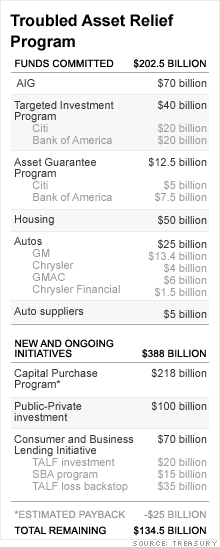Bailout watchdog: Credit crunch alive and well
In her latest report, Elizabeth Warren of the Congressional Oversight Panel says loans for small businesses and households are still tough to come by.
 |
| Elizabeth Warren |

NEW YORK (CNNMoney.com) -- Despite recent encouraging signs in the economy, Americans are having a hard time getting credit and the effectiveness of government programs to spur lending is unclear, a congressional bailout watchdog said Thursday.
"A snapshot of small business credit at the beginning of 2009 shows credit terms tightening and loan volume dropping," the Congressional Oversight Panel wrote. "Families are facing an even more difficult situation."
The report looked at the availability of credit for small businesses and consumer loans, such as credit cards, auto loans and student loans. It also looked closely at the government's TALF program meant to stimulate markets for those kinds of loans.
"Small business lending has not principally advanced through TALF," said the panel's chief Elizabeth Warren on Thursday. "It's much more through SBA loans, direct loans through community beaks and credit cards."
TALF -- for Term Asset-Backed Lending Facility -- aims to make consumer and small business loans more widely available by spurring what's known as the securitization of those loans. In securitization, banks that make loans in turn sell them to investors -- thus reducing the lenders' cost and risk.
The securitization market in the first quarter of 2009 was 80% below the level in 2007, according to the report.
The five-member panel, established by the law enacted last fall at the height of the financial crisis that set aside $700 billion to bail out banks and other companies, is headed by Harvard law professor Elizabeth Warren.
Warren has been an outspoken critic of the government's handling of the bailouts, arguing forcefully that the government rescue efforts need more transparency and tougher standards on banks.
But her latest report also acknowledges that many forces could contribute to restricted lending.
Rising unemployment might mean that households will take on less credit card debt, for example. And as the economy slows, small businesses might have less need for credit.
Even so, the report expressed concern about the effectiveness of TALF to help. "Despite favorable loan terms, the TALF is only beginning to generate significant demand. Some of the slow growth of demand is attributable to lack of demand for securitization, some to claimed flaws in the program's design, and some to fear of political risk. Under those conditions, it is difficult to predict at what rate the demand for TALF loans will increase." ![]()

